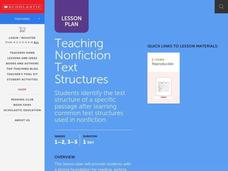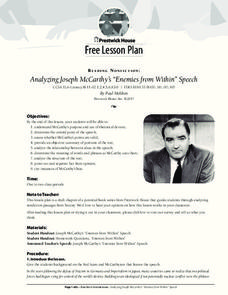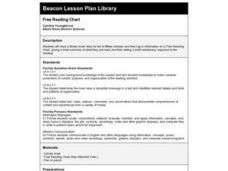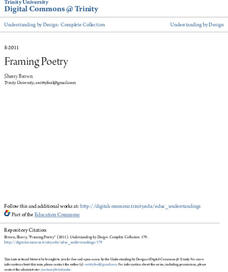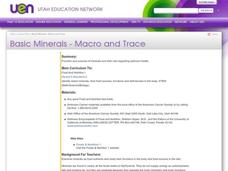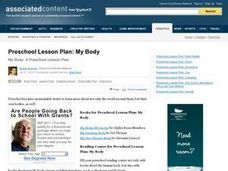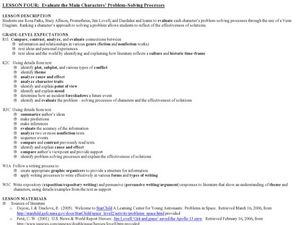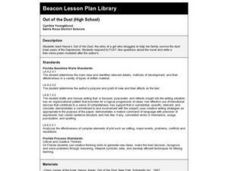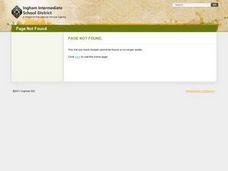Curated OER
Teach Text Structure for Nonfiction
Students gain a strong foundation for reading, writing, and using nonfiction through this instructional activity. They gain an awareness and general understanding what text structures are. Students also identify and interpret what...
Read Works
Signal Words in Expository Text
Signal words are one way that authors make the relationships between their ideas clear. Allow your learners the chance to investigate cause and effect in texts by identifying signal words. They locate and analyze cause-and-effect...
Curated OER
Text Structure 2
In this reading instructional activity, students read different passages of text and fill out graphic organizers for each one. Students read 6 texts total.
Curated OER
Advanced Lewis Structures
In this Lewis structures worksheet, students are given molecules that they must draw Lewis structures for and identify the total number of electrons. They also calculate charges on molecules, determine stability and draw the Lewis...
Houghton Mifflin Harcourt
Walt Whitman: From Song of Myself
Looking for a resource that models how to read and analyze a poem? Check out this packet that uses sections of Walt Whitman's "Song of Myself" to demonstrate how to paraphrase, note literary elements, and identify the poet's inferences.
Prestwick House
Reading Nonfiction: Analyzing Joseph McCarthy's "Enemies from Within" Speech
Looking for a lesson that teaches class members how to analyze nonfiction? Use Joseph McCarthy's famous "Enemies from Within" speech as a instructional text. Worksheet questions direct readers' attention to the many historical references...
Open Oregon Educational Resources
General Biology I: Survey of Cellular Biology (Mt Hood Community College Biology 101)
From the scientific method to the function of a cell, the eBook has it all. A useful resource provides a free biology textbook with a focus on context. The text begins with an overview of the process of scientific inquiry and biology...
Curated OER
Free Reading Chart
Middle schoolers read library books daily for ten to fifteen minutes, log information on Free Reading Chart, giving a brief summary of what they just read, and write brief reactionary response to the reading.
Trinity University
Framing Poetry
The big idea in this poetry unit plan is that structure and content work together to create meaning. Class members learn how to identify and mark the metrical patterns and line lengths used in poems. They study the structure of various...
Houghton Mifflin Harcourt
Problem Solvers: Challenge Activities (Theme 4)
Creative activities help bring literature alive. The first of a set of lessons designed to accompany selections from Theme 4: Problem Solvers uses activities such as skits, responses to music, and social studies projects. These...
Curated OER
How to Make Your Own Website
Students explore technology by creating a web page on-line. In this digital arts lesson, students identify the structure needed to create a website as well as the content required to keep visitors entertained. Students collaborate in...
University of Arizona
Identity Repair
In a detailed, creative writing task, potential poets analyze how race, identity, and society categorize and (mis)represent us. The learning begins with an imaginative anticipatory set where high schoolers describe unique situations that...
English Resources
Buddy by Nigel Hinton
The lessons that come from reading the novel Buddy by Nigel Hinton might be masked by how much you have just enjoyed the story, but don’t let an opportunity for learning pass you by. Let this learning scheme bring clarity to the ideas...
Curated OER
Gift of the Magi
While reading O Henry's "The Gift of the Magi," your class will define and identify situational irony and allusion. Use a study guide (not included, but easy to produce) to record and discuss examples of allusion as you read. Map the...
Indiana University
World Literature: "One Evening in the Rainy Season" Shi Zhecun
Did you know that modern Chinese literature “grew from the psychoanalytical theory of Sigmund Freud”? Designed for a world literature class, seniors are introduced to “One Evening in the Rainy Season,” Shi Zhecun’s stream of...
Curated OER
Basic Minerals - Macro and Trace
Identify minerals, their sources, functions, and deficiencies in the body. National Standard 14.2.1 Discuss macro minerals, electrolytes, and trace minerals Identify the problems associated with calcium and iron
Curated OER
"My Body"
Students participate in various shared reading and writing activities related to the book "My Body" by Rhonda Jenkins. They identify and list words that could be used to label other body parts in the book, draw a picture of their face...
Curated OER
The Princess and the Pea
Students participate in various shared reading and writing activities related to the classic fairytale "The Princess and the Pea." They identify the story elements, write an opening sentence for the beginning of the story, and discuss...
Curated OER
Evaluate the Main Characters? Problem-Solving Processes
Students read passages from several sources and evaluate the text for various criteria. In this problem solving lesson, students evaluate character problem solving processes after reading passages. They will use a Venn Diagram to compare...
Curated OER
Out of the Dust (High School)
Fourth graders read Hesse's "Out of the Dust". They respond to questions about the novel and write a free-verse poem modeled after the author's.
Curated OER
Sonnet 130
Students identify and interpret the structural features of literature through the study, analysis and production of Poetry. Including the structural characteristics. Students write a sonnet including required elements, such as length,...
Curated OER
Reading Between the Lines: Making Inferences About Idioms
Students discover idioms. For this inferencing lesson, students identify idioms from passages and infer meanings of unknown idioms using prior knowledge and experience. Students write sentences using newly learned idioms.
Curated OER
Poetry for Kids
Sixth graders be immersed indirect experiences which are opportunities for students to reflect, look back, debrief or abstract from their experiences what they have felt, and thought, and studied.
Curated OER
What If?
Second graders read WHAT IF? up to the page that ends "Suddenly, across the field they saw..." and discuss how the animals are feeling. They then discuss their feelings and in pairs discuss a possible ending to the story.


